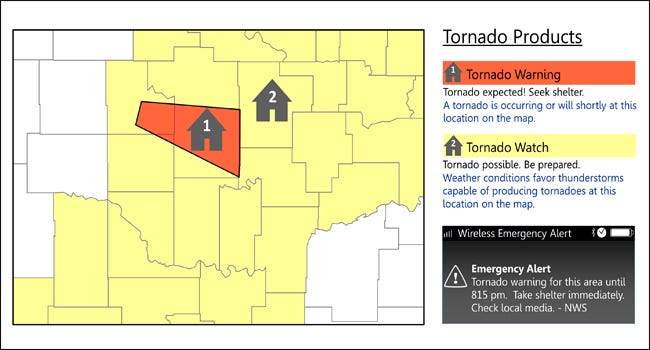Tornado season is spinning up again in Indiana, and with it comes weather alerts declaring different watches and warnings.
To help Hoosiers understand the difference, IndyStar is breaking down the difference between a tornado watch and a tornado warning.
When weather authorities, mainly the National Weather Service, issue a tornado watch, be prepared. These alerts mean tornadoes are possible in the area under the watch.
Watches mean the conditions favor thunderstorms that can whip up tornadoes.
Tornadoes extend from thunderstorms when instability leads to wind variations that support rotation, according to NWS. This instability comes from warm moist air at ground level mixing with cooler dry air above. Combine this with wind shear, and strong updrafts can start the rotations.
These conditions are perfect for a tornado, and when meteorologists detect them, will issue a watch.
Live weather updates:Tornadoes, large hail possible in Indianapolis Tuesday, April 2. Snow Wednesday, April 3?
When a warning is issued, take action. This means a tornado has been spotted either by someone on the ground or by radar.
Warning areas are typically smaller than those within a watch.
Trained spotters and law enforcement can notify NWS when visual cues of a tornado on the ground are obvious.
Doppler radar data and images can show forecasters certain patterns, called tornadic vortex signatures. These make it easier for meteorologists to spot dangerous weather.
To make it relatable, IndyStar created a handy graphic using the pork tenderloin sandwich.
A watch means the area has all the right ingredients to make a tenderloin sandwich, it’s just not assembled yet. With all the ingredients, a tornado could form within the area.
A warning means the sandwich is fully assembled (a tornado has been confirmed).
Tornadoes develop rapidly, so planning a safety plan ahead of time is important.
The National Weather Service has a preparedness guide for all types of severe weather including tornadoes.
Here are some rules when a tornado strikes:
- Move to a basement of safe room
- If there’s no basement, find a windowless interior room or hallway
- Leave mobile homes and find the closest sturdy building
- If outside: get into a vehicle, buckle up and drive to a sturdy building
Karl Schneider is an IndyStar environment reporter. You can reach him at karl.schneider@indystar.com. Follow him on Twitter @karlstartswithk.
IndyStar’s environmental reporting project is made possible through the generous support of the nonprofit Nina Mason Pulliam Charitable Trust.
